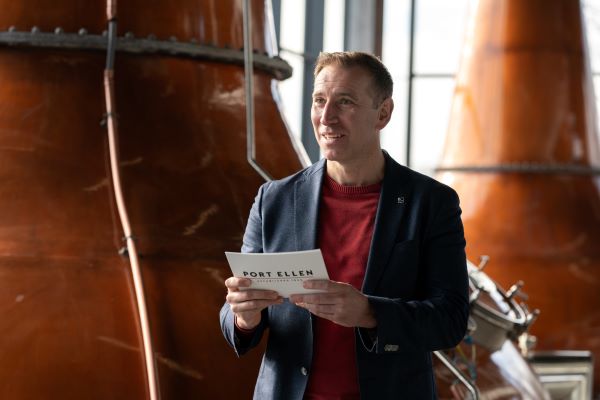Diageo's King of Supply
Ewan Andrew is one of those key figures in Scotch with the daunting task of steering the good ship whisky safely through these turbulent waters. Manoeuvring a supertanker would appear child's play by comparison reckons Tom Bruce-Gardyne …
Given that around 40% of all Scotch whisky is produced by Diageo, its decisions on fillings - how much to lay down each year - really matter to the trade. The man responsible is Ewan Andrew, Diageo's President Global Supply Chain & Procurement and Chief Sustainability Officer. It is a suitably grand-sounding title for what is arguably the most important single job in the entire industry.
The fate of 29 malt distilleries, one huge grain distillery, many hundreds of jobs and much else besides rely on Ewan and his team getting it more-or-less right. Over confidence in the category leading to overproduction risks creating another whisky loch. The last one began filling up in the 1970s, caused closures, unemployment, decimated margins, and took decades to recover from.

This has always been a cyclical industry, condemned to periods of feast or famine as distillers wrestle with the time lag between filling and bottling Scotch – an average of 7 - 8 years in the case of Diageo, as they forecast demand. Unforeseen global events can easily disrupt things in the meantime like the war in Ukraine which sent Russia tumbling out of the top ten export markets in a matter of months. Few saw that one coming.
Ewan doesn't dispute any of this, but he does believe the industry is managing supply with more finesse these days. "Rather than in the 1980s and 90s with its dramatic cuts and dramatic ramp-ups in production, the industry has learnt a lot from the bull-whip effects of that," he says. "And, I think Covid really accelerated those learnings in businesses and boardrooms where people understood the dynamics of supply chains much, much better."
As he confirmed at Diageo's FY24 results the company is increasing its net fillings this year, and plans to do the same next year, despite a 10% drop in its Scotch sales in the previous 12 months. "Things are normalising," he says. "At Diageo we've spoken openly about the corrections we've made in Latin America, and there's probably a softer consumer environment in the US, which is something we expect will take a little bit of time to recover."
"When I think of our business and my confidence in net fill, I always have to think of it in years and decades," he says. "We look at the long-term dynamics of Scotch, which has a very strong relationship with global GDP. It means you need to lay down stock in a precise way not just based on today's demand. You model the future out of the category, and you look at your share ambition within it."

He explains how the "explosive growth in 2022 and early '23" had never been anticipated by distillers when they were filling casks years earlies. Today, "as the category experiences a softening, that's your opportunity to move back into your right safety stock levels," he says.
Ewan likes to maintain what he calls "a notional safety stock" above demand. "It's for the operational requirements to manage any variables from year to year," he says. "The second thing is innovation, to ensure you've got liquid to innovate around in the future, and the third thing is managing these significant disruptions that happen on a 1 in 5, 1 in 25, 1 in 50-year basis."
Without such a buffer, he believes Johnnie Walker could never have grown by 33% in a year, as it did recently, and he is proud that "Diageo had the inventory to support that without diluting the rest of its portfolio." For him, the company's broad spread of single malts and blends means "you are able to play different tunes across that, and in any given year you can see accelerations in some brands, and that's potentially harder to manage in single malts."
Within Johnnie Walker, sales invariably shift back and forth between the core expressions of Red, Black and Blue Label depending on disposable income among other factors. This probably makes his job of getting the overall volume right a bit easier. However, there's a big limiting factor in all this, particularly in times of slackened demand, and that concerns wood.
"If you're not emptying casks sufficiently and acquiring new ones, you can't actually put down liquid for growth in the future," he explains. "Those that may want to continue at a higher rate of liquid lay-down tend to be constrained by the wood. There's always this self-healing nature between wood and warehouse availability." Although, interestingly, in the run-up to the last whisky loch there was no such constraint with ex-Bourbon barrels selling for as little as US$3 in the mid-1980s.

Non-quoted whisky companies believe their model suits the category better. "So, is there something about Scotch whisky that doesn't really lend itself to the short-termism of the City?" I ask. There's a long pause on our zoom call, before Ewan talks of "Scotch being a strong margin business that competes in a very vibrant category."
It doesn't quite answer the question and, who knows, maybe he's secretly a little jealous of William Grant & Sons? But when it comes to Diageo's commitment to the category, he is crystal clear. "Our ambition is to keep investing in Scotch, whether that's in maturing liquids, in our route to market or in A&P," he says. "Scotch is the crown jewels of the company."
This is reassuring. If Diageo just considered recent trends, it could almost be forgiven for throwing everything behind Tequila and its power brands of Don Julio and Casamigos that have huge untapped potential. If investment were diverted from Scotch, a decline would become self-fulfilling. But this is not a scenario that Ewan Andrew recognises, and you have to believe it's never going to happen on his watch.

Award-winning drinks columnist and author Tom Bruce-Gardyne began his career in the wine trade, managing exports for a major Sicilian producer. Now freelance for 20 years, Tom has been a weekly columnist for The Herald and his books include The Scotch Whisky Book and most recently Scotch Whisky Treasures.
You can read more comment and analysis on the Scotch whisky industry by clicking on Whisky News.
